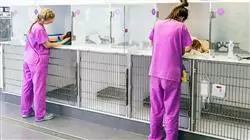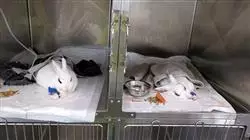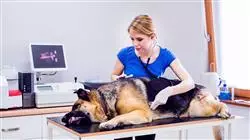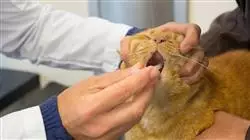University certificate
The world's largest faculty of veterinary medicine”
Why study at TECH?
In this program, you will approach the Digestive, Genitourinary and Endocrine Pathologies in Small Animals in a specific way, with a systematic methodology to delve into the pathophysiology of these processes, diagnostic protocols, therapeutics, as well as the monitoring and control of these patients”

At present, one of the problems that conditions continuous postgraduate specialization is its reconciliation with work and personal life. Current professional demands make it difficult to provide quality, specialized, face-to-face education, so the online format will allow our students to reconcile this specialized training with their daily professional practice.
A quality internal medicine allows a symbiotic work, necessary and indispensable in many cases, with other specialties, since many pathologies are translated into digestive, genitourinary and endocrine manifestations, among many others.
The veterinary internist of companion animals must have a high knowledge of digestive, endocrine and genitourinary pathologies, since they are very frequent in consultation. Thanks to this program, the veterinarian will be more informed about the diseases in this field of action, will achieve a better orientation about the patient with abdominal pain, digestive losses, pathologies associated with urinary systems, as well as endocrinopathies and, above all, will understand how to guide the owner in preventing those diseases of predisposed breeds.
The teaching staff of this Postgraduate diploma is made up of professionals specialized in the different areas of knowledge that internal medicine encompasses, with extensive experience in the clinical practice of this specialty. Additionally, these professors are accredited as specialists in different fields, working together in a veterinary specialty center. Some of them, in addition to performing quality clinical work, are participants in various research projects, so that, together with teaching and clinical work, they also carry out research activities.
The topics presented in this Postgraduate diploma have been selected with the aim of offering a complete, up-to-date and quality specialization in internal medicine, in such a way that the student acquires the appropriate knowledge to deal safely with cases, as well as to be able to carry out an adequate follow-up, monitoring and therapy.
Digestive, Genitourinary and Endocrine Pathologies in Small Animals clinic and for which the veterinarian must be prepared. Something you will achieve in just 6 months with this high-level program"
This Postgraduate diploma in Digestive, Genitourinary and Endocrine Pathologies in Small Animals contains the most complete and up-to-date educational program on the market. The most important features include:
- The development of practical cases presented by experts in Digestive, Genitourinary and Endocrine Pathologies in Small Animals
- The graphic, schematic, and practical contents with which they are created provide scientific and practical information on the disciplines that are essential for professional development
- Latest developments in Digestive, Genitourinary and Endocrine Pathologies in Small Animals
- Practical exercises where the self-assessment process can be carried out to improve learning
- Its special emphasis on innovative methodologies in Digestive, Genitourinary and Endocrine Pathologies in Small Animals
- Theoretical lessons, questions to the expert, debate forums on controversial topics, and individual reflection work
- Content that is accessible from any fixed or portable device with an internet connection
The completion of this program will allow students to obtain essential knowledge for their professional activity, whether in the clinical or academic sector or in research"
It includes, in its teaching staff, professionals belonging to the veterinary field, who bring to this training the experience of their work, in addition to recognized specialists from reference societies and prestigious universities.
The multimedia content, developed with the latest educational technology, will provide the professional with situated and contextual learning, i.e., a simulated environment that will provide immersive learning programmed to train in real situations.
This program is designed around Problem-Based Learning, whereby the professional must try to solve the different professional practice situations that arise throughout the program. For this purpose, the professional will be assisted by an innovative interactive video system developed by recognized and experienced experts in Digestive, Genitourinary and Endocrine Pathologies in Small Animals and with great experience.
Each chapter is accompanied by clinical cases that aim to apply the knowledge acquired and includes activities that will allow students to assess their knowledge"

This 100% online Postgraduate diploma will allow you to balance your studies with your professional work while increasing your knowledge in this field"
Syllabus
The structure of the contents has been designed by the best professionals in the field of Digestive, Genitourinary and Endocrine Pathologies in Small Animals, with extensive experience and recognized prestige in the profession, backed by the volume of cases reviewed, studied and diagnosed, and with extensive knowledge of new technologies applied to veterinary medicine.

We have the most complete and up-to-date academic program on the market. We strive for excellence and for you to achieve it too"
Module 1. Abnormalities in the Digestive System
1.1. Approach to Patients with Vomiting
1.1.2. Pathophysiology of Vomiting
1.1.3. Etiology
1.1.4. Clinical Symptoms
1.1.5. Alterations in Blood Count and Serum Biochemistry
1.1.6. Diagnostic Protocol
1.1.7. Treatment for Vomiting
1.1.7.1. Commercial Diets
1.1.7.2. Antiemetics
1.1.7.3. Gastric Acid Suppressants and Antacids
1.1.7.4. Stomach Mucosal Protectors
1.2. Approach to Patients with Diarrhea
1.2.1. Pathophysiology of Diarrhea
1.2.2. Classification and Etiology
1.2.3. Clinical Symptoms
1.2.4. Differential Diagnosis
1.2.4.1. Acute Diarrhea
1.2.4.2. Chronic Diarrhea
1.3. Common Pathologies of the Oral Cavity and Esophagus
1.3.1. Dysphagia
1.3.2. Cricopharyngeal Dysfunction
1.3.2.1. Cricopharyngeal Achalasia
1.3.2.2. Crochopharyngeal Asynchrony
1.3.3. Regurgitation
1.3.4. Esophageal Pathologies
1.3.4.1. Megaesophagus
1.3.4.2. Esophagitis
1.3.4.3. Oesophageal Stricture
1.3.4.4. Vascular Anomaly
1.3.4.5. Hiatal Hernia
1.4. Gastric Disorders
1.4.1. Acute Gastritis
1.4.2. Chronic Gastritis
1.4.3. Gastric Ulcers
1.4.4. Foreign Body Obstruction
1.4.5. Neoplasty
1.5. Small Intestine Diseases
1.5.1. Acute Enteritis
1.5.2. Chronic Intestinal Disease
1.5.3. Protein-Losing Enteropathy
1.5.4. Intestinal Bacterial Overgrowth
1.5.5. Neoplasms
1.6. Large Intestinal Diseases
1.6.1. Chronic Diarrhea
1.6.2. Infection by Tritrichomonas Foetus
1.6.3. Constipation in Cats
1.6.4. Ulcerative Histiocytic Colitis
1.6.5. Neoplasms
1.7. Principles of Ultrasound and Gastrointestinal Endoscopy
1.7.1. Two-Dimensional Description of Normal Digestive Structures
1.7.2. Gastroduodenoscopy
1.7.2.1. Patient Preparation
1.7.2.2. Preparation of Material
1.7.2.3. Procedure
1.7.3. Colonoscopy
1.7.3.1. Patient Preparation
1.7.3.2. Procedure
1.8. Hepatobiliary Diseases I. Hepatopathies in Dogs
1.8.1. Differences in Cats and Dogs
1.8.2. Diagnosis
1.8.3. Supportive therapy
1.8.4. Hepatopathies in Dogs
1.8.4.1. Chronic Hepatitis
1.8.4.2. Leptospirosis
1.8.4.3. Drug-Associated Hepatopathy or Liver Disease
1.8.4.4. Portal Vein Hypoplasia
1.8.4.5. Portosystemic Shunt
1.8.4.5.1. Congenital SPS
1.8.4.5.2. Acquired SPS
1.9. Hepatobiliary Diseases II. Hepatopathies in Cats
1.9.1. Hepatic Lipidosis
1.9.2. Acute Hepatitis
1.9.3. Chronic Hepatitis
1.9.4. Feline Infectious Peritonitis
1.9.5. Hepatic Amyloidosis
1.9.6. Drug-Associated Hepatopathy or Liver Disease
1.9.7. Hepatic Neoplasia
1.9.8. Biliary Diseases
1.9.8.1. Biliary Mucocele
1.9.8.2. Neutrophilic Cholangitis
1.9.8.3. Lymphocytic Cholangitis
1.9.8.4. Chronic Cholangitis Associated with Trematodes
1.9.9. Neoplasms of the Gallbladder and Bile Ducts
1.10. Diseases of the Exocrine Pancreas
1.10.1. Pathophysiology
1.10.2. Diagnosis
1.10.3. Acute Pancreatitis
1.10.4. Necrotizing Pancreatitis
1.10.5. Exocrine Pancreatic Insufficiency
1.10.6. Neoplasms
Module 2. Abnormalities in the Genitourinary System
2.1. Urinary Physiology and Clinical Manifestations
2.1.1. Physiology of the Kidney
2.1.2. Polyuria
2.1.3. Stranguria and Dysuria
2.1.4. Urinary Incontinence and Urinary Retention
2.1.5. Systemic Hypertension
2.2. Functional Urinary Disorders
2.1.1. Urinalysis
2.1.2. Creatinine and Urea
2.1.3. SDMA
2.1.4. UPC
2.1.5. Urinary Sediments
2.3. Disorders of Upper Tract
2.3.1. Glomerulonephritis
2.3.2. Tubular Disorders
2.3.3. Congenital Kidney Diseases
2.3.4. Ureteral Disorders
2.4. Disorders of Lower Tract
2.4.1. Cystitis
2.4.2. Urolithiasis
2.4.3. Prostate and Urethral Disorders
2.5. Chronic Kidney Disease
2.5.1. Diagnostic Approximation
2.5.2. Treatment
2.5.3. Monitoring and Follow-Up
2.6. Acute Kidney Failure
2.6.1. Diagnostic Approximation
2.6.2. Oliguric, Anuric or Polyureic? How to Differentiate Between the 3
2.6.3. Treatment, Monitoring and Follow-Up
2.7. Physiology and Clinical Manifestations of Reproductive System
2.7.1. Physiology of Genital Apparatus
2.7.2. Clinical Signs Associated with Reproductive System
2.8. Male Genital Apparatus
2.8.1. Genital Examination
2.8.2. Differential of Male Reproductive Diseases
2.8.3. Therapeutic Options and Guidelines
2.9. Females Genital Apparatus
2.9.1. Genital Examination
2.9.2. Differential of Female Reproductive Diseases
2.9.3. Follow-Up of Gestation
2.9.4. Therapeutic Options and Guidelines
2.10. Genitourinary Emergencies
2.10.1. Urinary Obstruction
2.10.2. Uroabdomen
2.10.3. Pyometra
2.10.4. Prolapse and Paraphimosis
Module 3. Endocrine System Disorders
3.1. Approach to the Endocrine Patient
3.1.1. Obesity
3.1.2. Polyuria/Polydipsia
3.1.3. Alopecia
3.1.4. Weaknesses
3.1.5. Hyperlipemia
3.2. Pituitary Disorders
3.2.1. Pituitary Dwarfism
3.2.2. Acromegaly
3.2.3. Diabetes Insipidus
3.3. Thyroid Disorders
3.3.1. Canine Hypothyroidism
3.3.2. Feline Hypothyroidism
3.3.3. Canine Hyperthyroidism
3.3.4. Feline Hyperthyroidism
3.4. Parathyroid Disorders
3.4.1. Canine Hypoparathyroidism and Hypocalcemia
3.4.2. Feline Hypoparathyroidism and Hypocalcemia
3.4.3. Canine Hyperparathyroidism and Hypercalcemia
3.4.4. Feline Hyperparathyroidism and Hypercalcemia
3.5. Pancreatic Disorders
3.5.1. Canine Diabetes Mellitus
3.5.2. Feline Diabetes Mellitus
3.5.3. Insulinoma
3.5.4. Glucagonoma
3.6. Adrenal Gland Disorders
3.6.1. Hyperadrenocorticism
3.6.2. Hypoadrenocorticism
3.6.3. Hyperaldosteronism
3.6.4. Pheochromocytoma
3.7. Sex Hormone Disorders
3.7.1. Hyperestrogenism in Females
3.7.2. Hyperestrogenism in Males
3.7.3. Other Sex Hormone Disorders
3.8. Diagnostic Approach to Endocrinopathies
3.8.1. Laboratory Tests
3.8.2. Diagnostic Imaging Techniques
3.8.3. Other Tests
3.9. Monitoring and Follow-Up of Endocrinopathies
3.9.1. Diabetic Patient Monitoring
3.9.2. Hypothyroid Patient Monitoring
3.9.3. Hyperthyroid Patient Monitoring
3.9.4. Monitoring of Patients with Hyperadrenocorticism
3.9.5. Monitoring of Patients with Hypoadrenocorticism
3.9.6. Caring for Patients with Parathyroid Alterations
3.10. Emergencies
3.10.1. Diabetic ketoacidosis
3.10.2. Addisonian Crisis
3.10.3. Thyroid Storm

This program will allow you to advance in your career in a comfortable way, balancing your personal and professional life"
Postgraduate Diploma in Digestive, Genitourinary and Endocrine Pathologies in Small Animals
The competitive sector of modern veterinary medicine offers better growth opportunities to professionals with a higher degree of preparation in different areas. Understanding this situation, and with the intention of offering quality academic alternatives, at TECH Global University we have prepared our Postgraduate Diploma program in Digestive, Genitourinary and Endocrine Pathologies in Small Animals. This postgraduate course will focus on the approach of the professional to the new trends and particularities that set the tone for the development of the area, deepening in the following concepts: knowledge of the new ways of treatment applied in the care of prostate and urethral disorders; the technical aspects to be considered in the development of a gastroduodenoscopy process; and the new technologies and methodologies used in the monitoring and follow-up of diabetic patients.
Study an online Postgraduate Diploma course
The large number of procedures, techniques and drugs applied in the care of digestive, genitourinary and endocrine pathologies, make this sector of veterinary medicine one of the most demanding with respect to the degree of expertise and knowledge of its professionals. In our program you will learn about the great unknowns, challenges and difficulties that accompany the veterinarian in the different practices of this field, contemplating their possible methods of resolution. Likewise, you will delve into the modernization of the following topics: knowledge of the new diagnostic imaging techniques used in the detection and diagnosis of endocrinopathies; and the different protocols used in the approach and management of genitourinary emergencies in cases of paraphimosis and prolapse.







